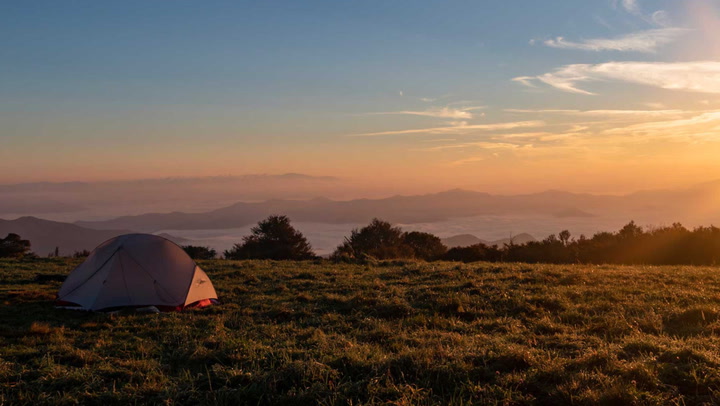1. Overview of Blue Ridge Parkway
2. Blue Ridge Parkway Camping Tips
3. Blue Ridge Parkway Campgrounds
Stretching 469 miles from Shenandoah National Park in Virginia to Great Smoky Mountains National Park in North Carolina, the Blue Ridge Parkway is one of the country’s most scenic drives. Whether you aim to travel the entire parkway from milepost 0 near Waynesboro, Virginia, to milepost 469 near Cherokee, North Carolina, or just plan to visit a small portion of the road dubbed “America’s Favorite Drive,” you’re bound to see some incredible Appalachian views. In fact, the Blue Ridge Parkway is among the country’s most visited parks, receiving over 15 million visitors in 2021. Once you see it for yourself, you will understand why.

The parkway offers a stunning journey throughout the year: Drivers will enjoy fresh blooms in the spring, lush greenery in the summer, and colorful foliage in the fall. Therefore, with a speed limit of 45 mph or less, it is designed for leisurely road trips, providing ample opportunities for stops to hike, picnic, and camp. Consequently, navigating the parkway over a few days and spending the night along the way allows for an incredible experience of the area’s outstanding natural beauty. Here are some essential tips and ideal spots for camping along the Blue Ridge Parkway.

Blue Ridge Parkway Camping Tips
The Blue Ridge Parkway is free to drive, and campsites incur a fee of $20 per night. There are eight NPS campgrounds at various points along the parkway, open from May to late October (depending on weather conditions). Visitors can find tentative operating dates for the year on the NPS website. Reservations are available for these eight campgrounds during the main season, while the last week of season offers only first-come, first-served availability.
Julian Price Park Campground and Linville Falls Campground also feature first-come, first-served availability from April 2 through May 28. Given the parkway’s popularity, it is advisable to make reservations ahead of time at recreation.gov—campsites can be reserved up to six months in advance. All parkway campgrounds include amenities such as potable water, flush toilets, sinks, dump stations, fire rings, and picnic tables.
Blue Ridge Parkway Campgrounds
Otter Creek Campground
Located at milepost 60.8, Otter Creek Campground provides 45 tent sites and 23 RV sites, as well as recreational activities like hiking and fishing, along with a visitor center. It is conveniently situated near the James River and various hiking trails including the James River Canal, Otter Lake Loop, and Otter Creek trails.
Peaks of Otter Campground
Found at milepost 85.9, Peaks of Otter is one of the parkway’s larger campgrounds, featuring 88 tent sites and 51 RV sites. According to recreation.gov, this campground typically has sites available, with 79 first-come, first-served options necessitating in-person bookings. The accommodation also features a lake, hiking trails, and a nearby lodge with a restaurant.
Rocky Knob Campground
Located at milepost 167.1, Rocky Knob offers 106 sites (25 tent only and 27 RV only). This campground frequently has first-come, first-served sites available, according to recreation.gov. It is nestled in the Rocky Knob Recreation Area, which features abundant opportunities for outdoor activities. Moreover, the nearby town of Floyd, Virginia, is known for its wineries, breweries, and shops selling local crafts.
Doughton Park Campground
Doughton Park, positioned at milepost 239.2, boasts 108 total sites (75 tent only and 24 RV only). The expansive 7,000-acre Doughton Park offers numerous trails for hikers as well as historic cabins and stocked streams ideal for trout fishing.

Julian Price Campground
The largest campground on this list, Julian Price, located at milepost 297, features 190 sites (90 tent only and 73 RV only). Visitors can rent canoes and paddle around nearby Price Lake, hike to picturesque waterfalls, and enjoy additional amenities, including showers.
Linville Falls Campground
Located at milepost 316.4, Linville Falls Campground offers 64 sites (14 tent only and 19 RV only). The area features exceptional hiking trails suitable for varying skill levels and includes a spectacular 45-foot waterfall worth visiting.
Crabtree Falls Campground
Regarded as the “hidden gem of Blue Ridge Parkway campgrounds,” Crabtree Falls, located at milepost 339.5, features 81 sites, with 18 designated for RVs. The Crabtree Falls Trail, a three-mile loop leading to a stunning 70-foot waterfall, is easily accessible from the campground.
Mount Pisgah Campground
The southernmost parkway campground, Mount Pisgah, located at milepost 408.8, features 125 sites (64 tent only and 50 RV only). This campground is quite popular, so it is advisable to plan ahead—especially on weekends. An added bonus: it boasts shower facilities.
Backcountry Camping
For campers who prefer the tranquility of primitive settings, there are three backcountry camping areas along the Blue Ridge Parkway: Rock Castle Gorge at Milepost 167.1, Basin Cove at Milepost 244.7, and Johns River Road at Milepost 296.9. To utilize these sites, a permit must be acquired (issued on a first-come, first-served basis) at the nearest office.





